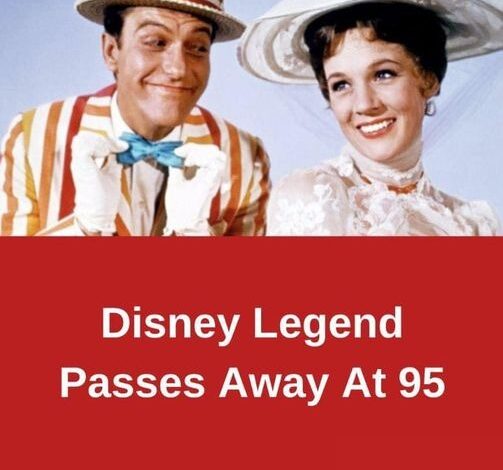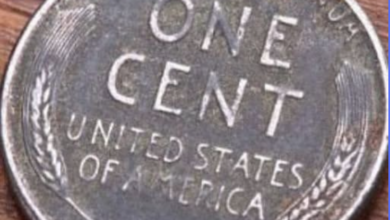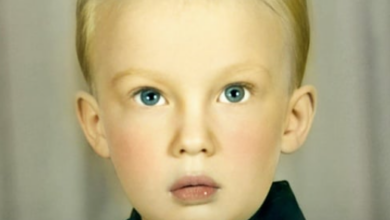
Disney Legend Passes Away At 95!
Hollywood is mourning the loss of one of its most enduring creative forces. Richard M. Sherman — composer, lyricist, and half of the legendary Sherman Brothers songwriting duo — passed away on Saturday at Cedars-Sinai Medical Center in Los Angeles. He was 95.
Sherman’s death marks the end of an era for The Walt Disney Company and for generations of fans who grew up on his melodies. From Mary Poppins to The Jungle Book, Chitty Chitty Bang Bang, and Winnie the Pooh, his songs shaped the sound of childhood and helped define what joy sounded like.
He is survived by his wife, Elizabeth Gluck, and their children, Gregory, Victoria, and Lynda.
Disney CEO Bob Iger paid tribute to the late composer, saying, “Richard Sherman was the embodiment of what it means to be a Disney Legend — an extraordinary talent whose music brought warmth, optimism, and a sense of wonder to audiences around the world.”
Sherman’s funeral will be held on May 31 at Hillside Memorial Park Cemetery in Culver City, California.
A Life in Melody
Born in New York City in 1928, Richard Morton Sherman was destined for music. His father, Al Sherman, was a Tin Pan Alley songwriter who penned hits for the likes of Benny Goodman and Louis Armstrong. That musical heritage shaped Richard and his older brother Robert’s future. Together, they would become one of the most celebrated songwriting duos in film history.
The brothers began writing pop songs in the 1950s, but their big break came when Walt Disney himself took notice of their catchy tune “Tall Paul,” sung by Mouseketeer Annette Funicello. It wasn’t long before the Sherman Brothers became Disney’s go-to songwriting team.
Their partnership with Disney produced some of the studio’s most unforgettable songs — works that continue to live in the collective imagination of audiences everywhere.
From the tender lullaby of “Feed the Birds” to the joyful whimsy of “Supercalifragilisticexpialidocious,” their music wasn’t just written for films; it was written for the human spirit.
A Disney Renaissance Before Its Time
The Shermans’ crowning achievement came with Mary Poppins (1964), a film that remains a masterclass in family entertainment. The brothers wrote the entire song score, earning two Academy Awards — one for Best Original Song (“Chim Chim Cher-ee”) and another for Best Substantially Original Score.
Their songs became more than music; they became emotional architecture for the stories they served. “A Spoonful of Sugar” turned a nanny’s wisdom into an anthem of optimism. “Let’s Go Fly a Kite” reminded audiences that joy can lift even the heaviest hearts.
Decades later, when asked about Mary Poppins, Richard often said that Walt Disney himself saw “Feed the Birds” as the emotional heart of the film. In interviews, Sherman recalled how Disney would occasionally stop by his office late on Fridays, sit quietly, and ask him to play the song — not as a producer, but as a man reminded of the value of kindness.
A Career Beyond Disney
Although forever associated with Disney, Richard and Robert Sherman’s musical influence extended far beyond the studio gates. In 1968, they wrote the Oscar-nominated score for Chitty Chitty Bang Bang, blending magic and mechanics into a musical fairytale that remains a classic of British cinema.
Their other film credits included Charlotte’s Web (1973), Tom Sawyer (1973), and The Slipper and the Rose (1976), which earned them two more Academy Award nominations.
Their knack for melody was matched by an uncanny ability to distill optimism into simple phrases — lines that children could sing but adults could feel.
When asked about their creative process, Richard once said, “We never tried to write down to children. We wrote songs we believed in. The moment you try to make it simple, you lose the heart. Kids can sense truth faster than anyone.”
Awards, Honors, and Recognition
Over the course of his career, Richard M. Sherman received countless accolades. Together with his brother, he won two Oscars, three Grammy Awards, and received nine Academy Award nominations.
In 1990, the Sherman Brothers were named Disney Legends — one of the company’s highest honors. In 2005, they were inducted into the Songwriters Hall of Fame.
Their music also earned them a rare kind of immortality: their songs became part of the fabric of Disney parks around the world. From “It’s a Small World (After All)” — one of the most performed songs on earth — to the catchy jingles of Winnie the Pooh attractions, their work is woven into the daily soundtrack of millions of lives.
Remembering the Man Behind the Music
Tributes from colleagues and admirers have poured in since the news broke. Pixar’s Chief Creative Officer Pete Docter called Sherman’s music “the heartbeat of childhood,” adding, “His joy for life was infectious. You didn’t just hear his songs — you felt his warmth in every note.”
Film historian Leonard Maltin echoed that sentiment, describing the Sherman brothers’ work as “a celebration of optimism.” He noted, “Their music had a bright, unshakable belief in happiness — and that belief spilled over into Richard’s life. He was as kind, curious, and upbeat as the songs he wrote.”
Those who knew him personally describe him as endlessly generous with his time, a man who could talk for hours about melody, memory, and the creative magic of collaboration. Even in his nineties, he continued to attend Disney events, meet fans, and share stories about working with Walt — the man he affectionately called “the greatest storyteller who ever lived.”
A Legacy That Will Never Fade
To understand Richard Sherman’s legacy is to understand the power of music itself — the way a song can transcend generations, languages, and time. His work did more than entertain; it gave people a sense of wonder.
In an era often defined by cynicism, Sherman’s songs stood firm in their belief that hope was still worth singing about.
“Supercalifragilisticexpialidocious” wasn’t just a tongue-twister; it was a reminder that nonsense can heal. “Winnie the Pooh” wasn’t just a lullaby; it was a portrait of friendship. “It’s a Small World” wasn’t just a tune — it was a vision of unity that crossed borders long before hashtags ever could.
His music remains a bridge — connecting parents to children, the nostalgic to the young, and fantasy to faith in goodness.
Even in his final years, Sherman was a fixture at Disney studios, often seen humming along to old recordings or mentoring young songwriters. When asked how he wanted to be remembered, he said simply, “As someone who brought a little more happiness into the world.”
The Final Note
Richard M. Sherman’s passing is not just the end of a life — it’s the closing chord of a melody that continues to play. His songs will be sung in living rooms, classrooms, and theaters for as long as stories are told and music is made.
For Disney fans, his legacy isn’t confined to credits or awards. It lives in the whistle of “Bare Necessities,” in the hum of “Let’s Go Fly a Kite,” and in the chorus of voices that join together every day around the world to sing, “It’s a small world after all.”
And somewhere, perhaps, Richard is smiling — listening to the sound of a world still singing along.
Because even at 95, his music never grew old. It never will.




